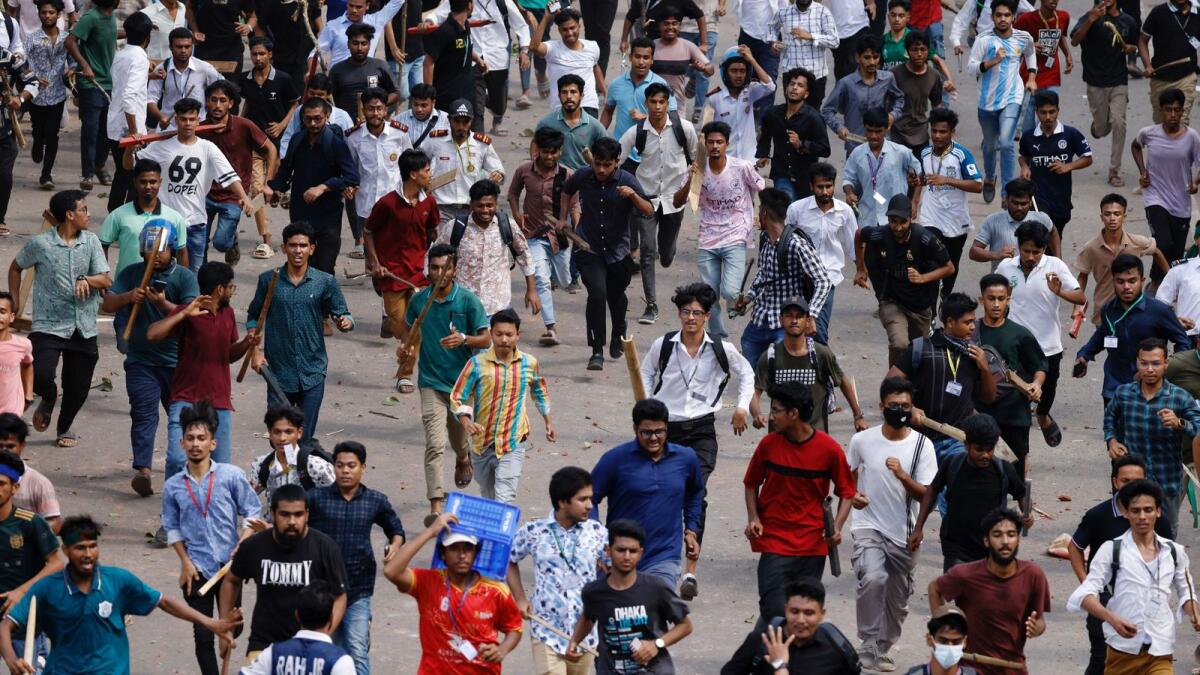Ongoing student protests in Bangladesh have led to a death toll of 50, with 702 people injured and 45 deaths reported since Tuesday. The protests are fueled by a quota system for civil service posts, high unemployment rates among youth, and dissatisfaction with the government. The demonstrations began on July 1 and have continued despite the suspension of the quota system on July 10. Bangladeshi expats in the UAE are feeling anxious as communication lines have been disrupted and internet services shut down in the country. Prime Minister Sheikh Hasina’s refusal to meet the protesters’ demands has escalated the situation, leading to violent clashes between protesters and ruling party members.
The nationwide protests in Bangladesh have gained momentum in recent days, with a death toll of 50 reported and 702 people injured, including 104 police officers and 30 journalists. The protests are driven by dissatisfaction with the quota system for civil service posts, high levels of youth unemployment, and the government’s response to the protesters’ demands. Despite the suspension of the quota system on July 10, the demonstrations have continued, with students and high school pupils blocking major roads and railway lines in cities across the country to draw attention to their cause.
The ongoing student protests in Bangladesh have become a significant challenge for Prime Minister Sheikh Hasina, who recently won her fourth term in office. The demonstrations have been fueled by high levels of youth unemployment, with nearly 32 million young Bangladeshis not in work or education out of a total population of 170 million. The protesters are demanding reforms to the civil service quota system and have criticized the government’s handling of the situation. The violent clashes between protesters and ruling party members have raised concerns both domestically and among Bangladeshi expats in the UAE.
The escalating situation in Bangladesh has led to growing anxiety among Bangladeshi expats in the UAE, as violent clashes between protesters and police continue to rage back home. Communication lines have been disrupted, and internet services shut down nationwide, making it difficult for expats to stay connected with their loved ones and stay informed about the situation in their home country. The protests, which have been ongoing since July 1, have put pressure on Prime Minister Sheikh Hasina to address the protesters’ demands and find a peaceful resolution to the crisis.
The protests in Bangladesh have generated significant international attention, with concerns about human rights violations and the safety of protesters and bystanders. The government’s response to the demonstrations and the suspension of the quota system have not appeased the protesters, who continue to demand reforms and justice for those who have been injured or killed during the protests. The violence and unrest in Bangladesh have highlighted the challenges facing the country’s youth and the need for meaningful dialogue and action to address their grievances and bring about positive change.
In conclusion, the ongoing student protests in Bangladesh have led to a tragic loss of life and injuries, highlighting the deep-seated issues of youth unemployment and dissatisfaction with the government. The protests, which began on July 1, have escalated into violent clashes between protesters and ruling party members, raising concerns both domestically and internationally. As the situation continues to unfold, it is crucial for all parties involved to prioritize dialogue and find peaceful solutions to address the protesters’ demands and bring about positive change in Bangladesh.











